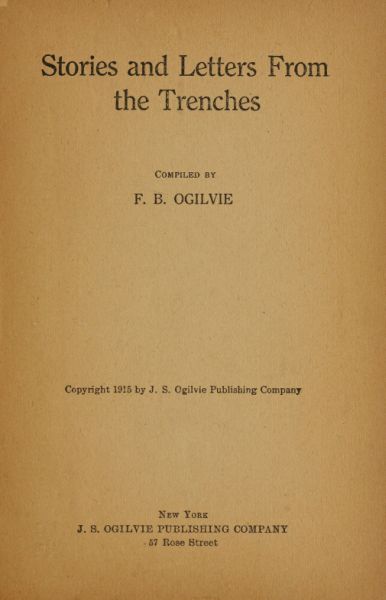
Photo by International News Service
BELGIAN SOLDIERS BEHIND THE ENTRENCHMENTON THE ROAD TO MALINES

Stories and Letters From
the Trenches
Compiled by
F. B. OGILVIE
Copyright 1915 by J. S. Ogilvie Publishing Company
New York
J. S. OGILVIE PUBLISHING COMPANY
57 Rose Street
ACKNOWLEDGMENT
Our thanks are due and are hereby tendered toDr. Mary Merrit Crawford of Brooklyn, N. Y., for herletters regarding the Paris hospital patients, to theNew York Times for the article, "Three Months in theTrenches," by Bert Hall, and for other letters; and tothe New York Sun and various other publications forthe numerous items of intense human interest whichhelp to make this collection an accurate record ofconditions at the front in the colossal European War.
THE PUBLISHERS
PREFACE.
Letters received from soldiers in the field describemany features of the various campaigns ofthe war, the descriptions coming from representativesof widely differing classes of society. Unlikethe rigid censorship imposed on the alliedtroopers by their official censors; the letters ofGermans in the field show that wide liberty of expressionis allowed, with only the names of places,troop divisions, and commanders, and occasionallydates, deleted.
At the front are many men of prominence inmany walks of life. Some of the greatest present-daypoets and novelists are in the field, andthat, too, serving in humble capacities, takingtheir risks side by side with the men in the ranksor as non-commissioned officers and sharing thedaily routine of the common soldier's life. Undemocraticas officialdom is in times of peace, andharsh as its discipline has been pictured in timeof war, letters from notables at the front show asurprising spirit of democracy in the relations ofhigh and low on the battlefield, in the trenches,and on the march.
The letters from the front include missivespenned or scribbled by nobles and members ofthe royal families, high military officials, authors,Socialists, tradesmen, skilled workmen, and writerswho, in peace times, have been more expertwith the farmhand's scythe or manure fork, orwith the street cleaner's broom than with the pen[4]that is supposedly mightier, and certainly to themmore unwieldy, than the sword.
Nevertheless, even among the privates, it is extremelyrare that a letter shows illiteracy to anymarked degree. In the letters written by highand low alike, there is to be noted a certain theatricalconsciousness of the stage on which theyare now engaged in battle before the world.
WAR STORIES.
THREE MONTHS IN THE TRENCHES.
AMERICAN WHO SERV